As the Republican party takes over our federal government, U.S. Congressman Earl Blumenauer feels like all hope for his transportation and livability agenda is not lost. Reached via phone from his D.C. office yesterday Portland’s popular representative referred to the election results as “personally appalling” and “grim news for the presidency.”
But despite major losses for Democrats, Blumenauer, who won over 73 percent of the vote in Oregon’s 3rd congressional district on Tuesday, is optimistic about the future of “livable communities” — a set of issues and policies he’s built a legacy on during 20 years in office.
In an interview yesterday I asked Blumenauer for his thoughts on the election, whether he’ll work with the Trump administration on a new transportation funding bill, and more. The questions and answers below have been edited for clarity.
What’s your response to what happened last Tuesday? Any silver linings?
Let’s call them copper linings. As for the confused national election picture, it’s something that people are going to be questioning for months. I personally was appalled, because it wasn’t just about a Republican versus a Democrat, or your favorite candidate not winning. I was appalled by the tenor of the campaign and what Trump represented on many diferent levels. There’s something deeper going on here. Things that are very important to sort out in terms of how the country goes forward.
One thing that’s clear to me is that if we can connect with people on things that matter to them and we can engage activists and adovcates, than people can be persuaded to support the things we care about.
On that note, you mentioned in an email to me earlier this week you were very happy about the success of marijuana and transit initiatives nationwide. What can people who support better biking learn from those successes?
(Note: The nonprofit People for Bikes estimates about $4.7 billion in cycling infrastructure funding out of about $200 billion in transit investments nationwide.)
I am ecstatic about what has happened in the area of transit around the country. These proposals were mostly transit, not just some transit stuffed into a larger proposal, and they included biking and walking. Of the $200 billion, it’s about $170 billion for transit. 33 of 49 state and local public transit measures passed — that’s a pretty good batting record. When you look at the margins of victory these proposals got an average of 60 percent. There’s broad demonstrated support for things that matter.
“If four years from now the places that can make the most advantage of transportation investments don’t get that help, that’s going to be not just a missed opportunity in terms of safety and economic benefits of transportation — it’s going to be a lost political opportunity as well.”
I also think the marijuana legislation is interesting. Those propsoals passed in eight of nine states they were on the ballot. There was pretty significant opposition to them from some of the forces that have supported Trump and the Republican takeover of Congress, like the Koch Brothers and Sheldon Adelson [a casino magnate], who put big money into them, and somehow the fact that the majority of the public saw through that and supported the measures anyways, I found very encouraging.
And in Oklahoma, a state that gave Trump over 70 percent of the vote, people voted for animal welfare over the farm bureau on a so-called Freedom to Farm bill that would have gutted environmental protections and animal welfare protections. It was voted down 60-40.
This is a movement that has been driven almost entirely by people, not politicians. There’s an amazing power that can be harnessed when citizens decide they’re going to take control of an issue. It’s like marriage equality. That was not driven by politicians, it was fueled by citizens. All of these things don’t get on the Sunday morning talk shows but they are things that matter to people and where people can take steps to make a difference. In some cases they cost money but people are willing to spend money for livability.
I look at these results to be every bit as significant as what happened with the Trump phenomenon… When I look at these other areas where there are broad coalitions that will take simple, defined steps to meeting objectives that promote livability, I’m encouraged. And I think that’s something that ought to give heart to the people in the trenches who want safe streets, who want to be able to promote walking and biking, who want balanced transportation systems.
The Trump phenomenon notwithstanding, these issues resonate with people. They will listen to thoughtful campaigns, they will vote for change and even to tax themselves. That’s the focus we need to have going forward: to make that type of connection and make it resonate in ways people understand. To not be intimidated by the politcal climate, but be willing to step forward with things that will make a difference.
Advertisement
Assuming there’s less support for non-motorized transportation at the national level, how can we push back at the local level to shape federal policies?
If we play our cards right what happens at the state and local level cannot only make a difference at the local level but it can help inform and shape federal policy.
“It’s hard to really fully understand what Trump is talking about with his infrastructure plan. You kind of get the feeling that, like his campaign, he’s kind of making this stuff up on the fly.”
It’s hard to really fully understand what Trump is talking about with his infrastructure plan. Sometimes he’s said he’ll just add it to the national debt. There appears to be a bias toward public-private partnerships. But you kind of get the feeling that, like his campaign, he’s kind of making this stuff up on the fly. People in the industry don’t have a good fix on what exactly he’s talking about. And there are competing plans back here [in D.C.]. People have for years talked about reforming transportation by changing the tax system and funding it that way, or repatriating funds from overseas. Obama himself has recommended it should be part of tax reform. I’ve been skeptical of that because these are gimmicks that take us away from user-pays and makes the funding subject to the vagaries of the federal funding cycle — not good if you’re trying to undertake important, long-term infrastructure investments that need predictability.
I continue to think we could get back to that user-pays space. Eight red Republican states raised the gas tax in 2016. My vehicle-miles-traveled [VMT] legislation has been supported by truckers, AAA, the Chamber of Commerce, the broadest coalition of support for any piece of legislation in congress. We want to raise the gas tax, index the gas tax, then replace the gas tax with a VMT fee/road user charge. That road user charge is embedded now in the FAST Act [existing federal transportation law], we have eight pilot projects underway, and there’s funding available for the next four years to continue that work. Ultimately a road user fee is going to be the most sustainable, fairest and effective way going forward. Taxes on gallons of fuel consumed — like the white male voters with less than a college education who voted for Trump — are in decline.
We have a chance to continue this work on the state and local level and use that leverge to encourage congress to do its job. We’re going to continue to agitate and organize and keep that coalition alive and have people focus on what they want. We’ve seen for years now proposals that aren’t tied to dedicated, predicatable revenue sources collapse under their own weight. There are too many competing interests. I don’t mean to put a happy face on this — I think we were positioned to be able to make some real progress with Clinton and a better congress. The congress is not what I’d hoped and the Trump administration is a black box with a question mark and lots of competing signals. Some people who are a little unnerving are associated with it. But the facts don’t change. We have a massive infrastructure deficit, we have the capacity to pay for it, and as proven with initiatives at the state and local levels, there is public will to get it done.
What do you think about the rumors that John Mica could get the Transportation Secretary job?
John Mica is talking about being transportation secretary. I’ve had a fair number of conversations with insiders and non-partisans, and you know, the only time Mica’s name has come up is when somebody is wondering why he’s saying he’s in the running for that job. Who knows? But it is very much a question mark.
Will you work with the Trump administration if/when a transportation funding bill comes up?
I will support additional resources for rebuilding and renewing America. My enthusiasm declines rapidly if it is going to be as series of disconnected, sub-optimal projects. As we know, investing in transit and bike/ped facilities, trying to maintain a state of good repair — these create more jobs than simply building another freeway mile. We’re also in a situation in most of America where we can’t even pay for what we’ve got, so attention should be paid to preserve and enhance existing facilities. And we should prioritize things that are going to promote mobility. There are some potential road projects under consideration that really do solve congestion, and aren’t just extra capacity. Prioritize things that will keep people safe and promote mobility and have the most economic impact. It would be ideal to dust off the Recovery Act and TIGER grants. Those were the most popular projects and programs in history. There were hundreds of applications, tremendous impact, they leveraged funds. And doing something like that would make sure that the people at the state and local level did their job so federal money was maximized and less likely that we end up with sub-optimal projects.
I don’t know where they are with their thinking process if the plan goes through the filter of his political support, which is to say rural and small-town America, that’s not where congestion is and where it’s not safe to bike and they don’t have transit access. If all you do is pour concrete — where the problem is access to transit and safety — that will be a lost opportunity. And the metro areas are where federal dollars will promote movement of freight and have more economic impact and cut down on carbon pollution. A failure to address this properly is not only going to be a short-term problem for the country it will erode potential political support and it will set in motion some interesting political dynamics. If four years from now the places that can make the most advantage of transportation investments don’t get that help, that’s going to be not just a missed opportunity in terms of safety and economic benefits of transportation — it’s going to be a lost political opportunity as well.
Look at Houston: When I started in this business, Houston was a Republican bastion, had second highest per capita fuel consumption, sprawl, no zoning laws. In the last five years Houston has opened three light rail lines and they’re looking hard at downtown housing. In 2012 I was campaigning with their mayor (a lesbian Democrat) for a $200 million bond for cycling infrastructure which passed overwhelmingly. And interestingly Houston is all Democrats now. So this is something that has direct quality of life implications and political implications. I don’t want Donald Trump to fail because America fails; but I have no interest in being a cheerleader for something that isn’t going to do what we need done. And it doesn’t have to be this hard. The coalition is there, or can be easily developed.
Do you feel like that coalition has fractured at all because of the election?
I think there are people who are concerned and who will make their own calculations if they get on board. But I think people recognize this is something that shouldn’t be political. This is something that should be driven by data, by numbers, by what the public wants, and what works. And the places that are growing and vibrant in this country are the places that are investing in balanced infrastructure and frankly, tilted toward bicycling, pedestrian and transit. That’s where the milennials are going, that’s where housing values are rising because people want to live there.
You mention data and numbers, but this is a post-fact environment now. How does that change the biking pitch?
I don’t think there needs to be a radically different approach. I think what we have seen around the country, support for bikes, pedestrian and transit has taken hold. It gets traction because it touches people where they live, because there are proven solutions, because failing to take a balanced approach doesn’t work. I think strengthening the coalitions, continuing to make progress at the state and local level is important and I think this is a movement that is about to crest.
This isn’t radical, wild-eyed stuff. It really is something that is not partisan. It is just as powerful in rust belt communities as in the blue coasts and I think people just need to think about what’s different, think about the new players, and deal with cards we were dealt. But we’re on the right track here, we’re operating from a position of strength being demonstrated in communities large and small. We need to not be afraid to work to get there.
I believe this is part of what is going to help America move forward in the next four years. This is something where we can get progress while we sort out the stuff on the national level. I think there’s increasing political muscle behind this agenda. If I were Donald Trump’s advisor, I’d say, ‘Look outside Trump Tower and look at the positive aspects of what’s happening on the streets.’
Will you work with Trump, or actively oppose him?
I have no intention of being involved with anything I think moves us backwards. I will fight with things that undercut our core values, our principles, or our progress. I find some of the people he’s bringing in, my lord, it’s appalling. The fact is there will be legislation moving forward in this congress and there’s although there’s a Trump administration it may or may not be Trump’s legislation… I think congress is going to do things on infrastructure and I’m going to try to make whatever congress does be as good as it can be. There are areas where you don’t give an inch and areas where you fight back. There will be lots of things to oppose this administration about. The problem will be where you concentrate your time and energy.
We’ve told our readers that the stakes have never been higher for the National Bike Summit this year. Do you agree? Will you attend?
I will be there if it’s humanly possible. As I mentioned this is a time when there are lots of moving pieces, but what we have done in this space over the course of the last 15 years is pretty remarkable. Cities are being transformed. I look at where we’ve come from, through administrations of Clinton, Bush, Obama — it’s been roller coast ride but we’ve seen progress in the cycling sector continously. And it’s important to keep that momentum going. I hope there will be a big turnout at the Summit.
— Jonathan Maus, (503) 706-8804 – jonathan@bikeportland.org
BikePortland is supported by the community (that means you!). Please become a subscriber or make a donation today.



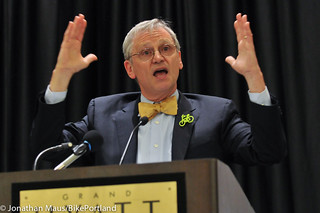
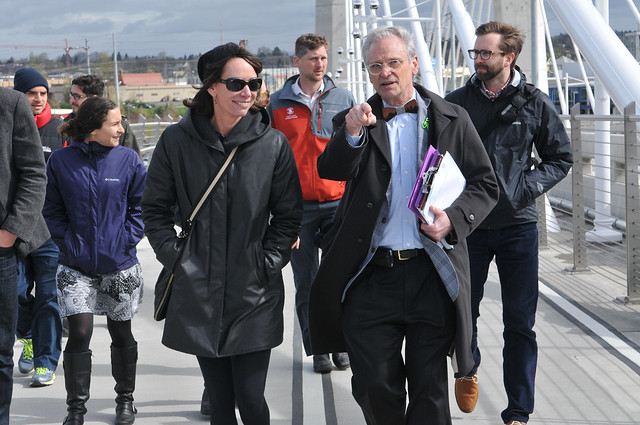
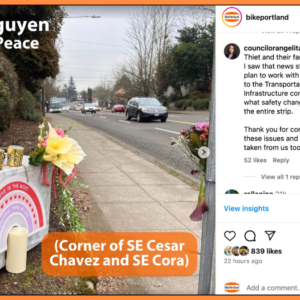
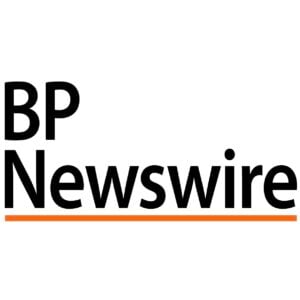
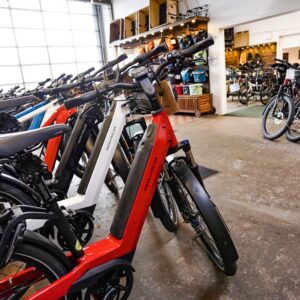
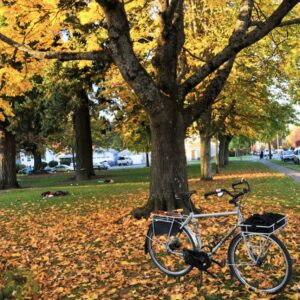
Thanks for reading.
BikePortland has served this community with independent community journalism since 2005. We rely on subscriptions from readers like you to survive. Your financial support is vital in keeping this valuable resource alive and well.
Please subscribe today to strengthen and expand our work.
Hillary voted to bail out the auto industry.
What is your point? You have posted this about 10 times…
Yeah Rick. I think dwk has a point. Please reconsider posting comments like that in the future. Again, the idea here is to add to the conversation and create a space where productive dialogue can happen. Does your comment about Hillary’s bailout vote do that?
I was reading this article to see what Earl had to say about the state of transportation funding on the dawn of what is sure to be a Golden Age of public transportation and bicycle infrastructure. I therefore found it very helpful and relevant to recall, once again, just how Hillary Clinton had voted on the auto bailout way back in 2009.
I’d be curious if anyone here knows how Marco Rubio voted on the failed tax cut legislation in 2011.
Equating the auto bailout with not supporting cycling is silly at best. Even if ones position was the quick elimination of automobiles world wide, not bailing out the U.S. auto industry in 2009 would have been a poor way to accomplish it. The domestic auto industry got in to financial trouble in 2008-2009 because the credit system collapsed, and the purchase of autos in the modern world is nearly entirely dependent on credit. If they had not been bailed out they would have simply been purchased by foreign auto companies and cherry picked for their profitable lines. As the credit system recovered we would have been left with the same number of autos sold, but less of them would have been made in the U.S. and none of them under U.S. ownership.To reduce automobiles on our streets and their effect on health, safety, urban planning and the environment we need to curtail demand for them, which is what this blog is all about.
The domestic auto industry was in decline for more reasons than just the mortgage and credit frauds from 2007 and 2008. Chrysler wasn’t making an economy car and GM wasn’t making great automobiles except for the Corvette and the Cadillac CTS.
I won’t reconsider the facts after it has been documented.
It’s worth noting that VP-elect Mike Pence is reported to be an avid bike rider. If so, let’s hope he educates Trump about the importance of ped/bike trails, the national bike route system, and walking-oriented projects. Building bike trails create jobs, too. Remember, Timberline Lodge and many of the hiking trails in the Mt. Hood National Forest were created by CCC crews in the 1930’s/’40s. Reviving that concept for rebuilding our roads, rails (including a much-needed expansion of Amtrak) and bike trails would make a great deal of sense.
I commend you for seeking a silver lining in the darkest of clouds.
So was Dubya, for all the good that did us.
Hmm…what kind of avid bike rider?
The kind that says: “I’m an avid cyclist, but…”
“I have lots of friends who ride bikes…”
the kind that rides a suspension mountain bike on the road from his house to the voting booth…
Never know when your gonna want to rail some single track.
I too would lilke to know something more about interest soon to be VP Pence has in biking. I’d be delighted if he’s done a bit of bike commuting, and maybe some fast fitness conditioning, some 30 mile, 40 mile, or more, weekend rides that have given him sense of what is to ride on roads where lots of motor vehicles are in use.
These people that are so tied down that when they’re not siting in the office, they’re being chauffered to one appointment to the next to sit some more, or riding around the golf course in a golf cart, doesn’t sound like activity that would bode well for active transportation.
It seems like it would help if some of the high up political figures had some first hand experience with biking the country’s roads and believed the opportunity to do that was important to be available and safe for people in the U.S. to enjoy.
In response to the interview questions, Blumenauer seems comfortable talking at length. He seems careful to not get caught up in the doom and gloom some people are feeling as they wonder what Trump and his administration could put forth. I’m glad to hear that. And it sounds as though Blumenauer is committing himself to put up resistance if need be. Also good. I’m hoping for the best, and trying to be prepared for the worst that the trump administration may bring. At this point, it’s all a grab bag of sorts, until he actually takes office.
He’s good at playing the game, which is exactly what I’d expect of an experienced politician. He’s a good asset to have on our side.
Maybe we should send him a copy of Elly’s book Bikenomics. If nothing else, someone on his staff might read it and provide a brief.
CCC may have worked fort the time but the modern day AmeriCorps NCCC is a waste of tax dollars.
We have had a partnership with Americorps (we have a higher rate of students in poverty) for quite a few years. They have always proven invaluable, especially for the after school homework assistance program. The 1:1 assistance they provide for students in the area of literacy development is critical for making needed gains to meet benchmarks required for graduation.
Why do I feel like Trump will forbid him from cycling during his term?
Pence is hostile to active and public transportation.
The 2014 Blue Ribbon Transportation report illustrates this:
http://www.in.gov/gov/files/Blue_Ribbon_Panel_Report_July_9_2014.pdf
Most of the people talking about the election are talking about the Presidential election, but there’s more to it than that. In 2009 there were 18 states with both Democrat Governors and a Democrat majority of their state legislators. That number is now six (California, Connecticut, Delaware, Hawaii, Oregon and Rhode Island).
We know how hard it is to convince the Democrats that control Oregon’s state government to act in favor of vulnerable road users. Now 88% of US states have either Republican control or a shared government. Obviously the old tactics haven’t worked. We’re going to need knew thinking to meet our needs.
Tour de Trump
– At least Trump has or has had some connection with cycling. Give him a chance – !
I would be interested to know what Earl has accomplished in office lately. I appreciate his values; they’re a good start. But specifically, what important bills did he initiate (not just co-sponsor) that have become law?
I’m not sure about accomplishments of late, but I thought he helped to get the Springwater Trail bridge over deadly Highway 99E.
You could call me a “recovering political news junkie” right now. Thanks, Jonathan, for the first hopeful article I’ve read since weeks before the election!